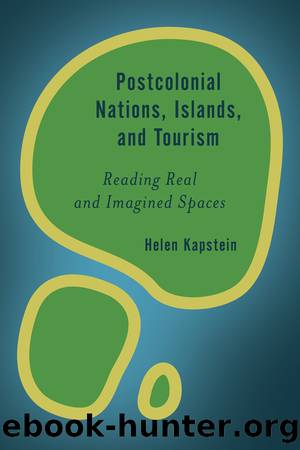Postcolonial Nations, Islands, and Tourism: Reading Real and Imagined Spaces by Helen Kapstein

Author:Helen Kapstein [Kapstein, Helen]
Language: eng
Format: epub
ISBN: 9781783486465
Google: 1SEdswEACAAJ
Goodreads: 53102226
Publisher: Rowman & Littlefield Publishing Group, Incorporated
Published: 2017-07-11T00:00:00+00:00
Figure 3.1.Portrait of Robert Knox.
The conceit that Knox âhas freely givenâ the kingdom to his readers amounts to a textual transfer of property rights to the British even though Knox was the prisoner of the Ceylonese. Notwithstanding the attempt to flip the narrative after the fact, a history of islands is always also a history of captivity, from Knox and Crusoe to Mandela and Marc, who at one point is tagged and quarantined. Captivity repeats itself as we readers of Knox (or Gunesekera) are subsequently captivated by the reading experience: âRead therefore the Book itself, and you will find yourself taken Captive indeed, but used more kindly by the Author, than he himself was by the Nativesâ (Hooke 20). Despite Hookeâs reproach, Knox himself tells us on more than one occasion that he was actually used quite kindly. His experience marks the beginning of âa long tradition of washed-up tourists suffering what [Eldon] called inescapable hospitality here. ⦠I think he really believed that in any country it is only the foreigner who can feel a genuine sense of belonging, of arrival, of arriving home. We become committed: perpetually enchanted or permanently detainedâ (HE 41). Being captivated, tourists and readers are held captive and held in thrall both.
Professions of genuineness and authenticity lie at the heart of tourism. Marc aligns himself with this tradition of tourism in hope, paradoxically, of being able to lay claim to a genuine belonging made possible because the tourist space has always already been made familiar. As the returning native he is a different sort of domestic tourist: one who has domesticated and familiarized the place to which he returns. He has a doubly privileged vision which allows him to perform that old medieval travelerâs trick of turning curiositas into similitude, perceiving the foreign as known in order to make sense of it. The tourist familiar absorbs the unfamiliar; so much so that the word familiar appears throughout the text: âThe scene was familiar, even though I had never seen it beforeâ (HE 130); âThe lily pads were familiar. Like those in the Waterlily House in Kewâ (HE 172); âFrom the front I could see a riot of pinks and oranges. Colours that seemed profoundly familiarâ (HE 179). Prepared by the colonial (horti)culture of the botanical garden, his gaze processes the foliage of the Sri Lankan jungle as hothouse flowers. In an extended metaphor, Marc identifies with migrant birds he remembers from his childhood. The parakeets, incongruously appearing in England as though âout of my jungle bookâ (HE 180), lent vibrancy and color to that island. Now, Marc feels he has reached their âoriginal homeâ (HE 180). Tellingly, it takes the migrant bird, recognized from the English garden, for him to determine his âactual havenâ (HE 180) on this new island. Like Knox, like Crusoe before him, Marc processes the unknown by way of England. For the third-generation immigrant, trickle-down nostalgia means that longing is not experiential but inherited. It becomes more than a mere
Download
This site does not store any files on its server. We only index and link to content provided by other sites. Please contact the content providers to delete copyright contents if any and email us, we'll remove relevant links or contents immediately.
The Power of Myth by Joseph Campbell & Bill Moyers(1057)
Half Moon Bay by Jonathan Kellerman & Jesse Kellerman(979)
Inseparable by Emma Donoghue(976)
A Social History of the Media by Peter Burke & Peter Burke(973)
The Nets of Modernism: Henry James, Virginia Woolf, James Joyce, and Sigmund Freud by Maud Ellmann(891)
The Spike by Mark Humphries;(809)
The Complete Correspondence 1928-1940 by Theodor W. Adorno & Walter Benjamin(783)
A Theory of Narrative Drawing by Simon Grennan(775)
Culture by Terry Eagleton(770)
Ideology by Eagleton Terry;(731)
World Philology by(712)
Farnsworth's Classical English Rhetoric by Ward Farnsworth(711)
Bodies from the Library 3 by Tony Medawar(707)
Game of Thrones and Philosophy by William Irwin(707)
High Albania by M. Edith Durham(698)
Adam Smith by Jonathan Conlin(686)
A Reader’s Companion to J. D. Salinger’s The Catcher in the Rye by Peter Beidler(675)
Comic Genius: Portraits of Funny People by(649)
Monkey King by Wu Cheng'en(646)
